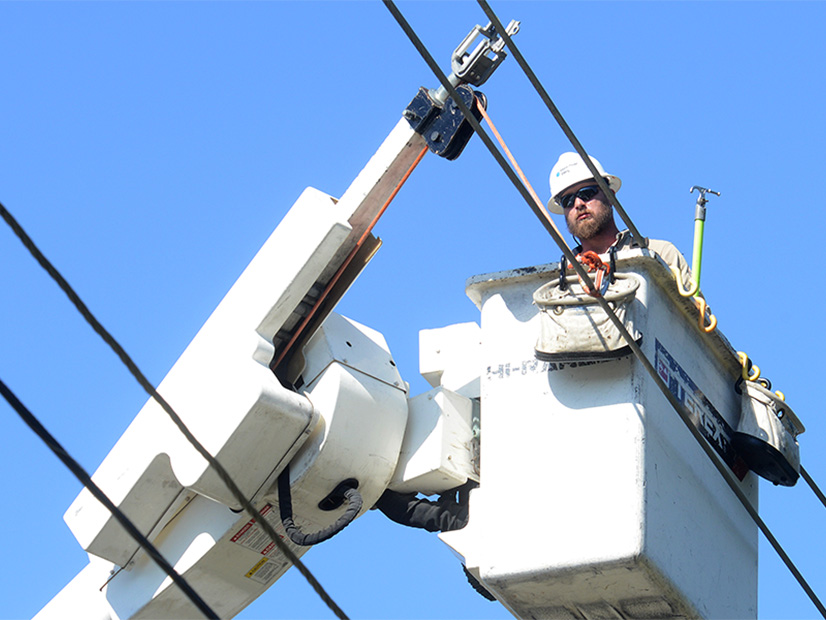Competitive transmission developer LS Power has lodged a complaint against MISO for treating Indiana’s right of first refusal law as if it’s in effect when it’s under a preliminary injunction, arguing it’s being denied the chance to bid on a share of more than $1 billion in proposed transmission.
LS Power alleged in a Feb. 4 complaint that MISO is violating its tariff by playing by the state’s ROFR law even though the U.S. District Court for the Southern District of Indiana has temporarily forbidden its enforcement (EL25-55).
LS Power said MISO erroneously considers a preliminary injunction of the ROFR to not affect the law’s status but agrees a permanent ban would render the law irrelevant. The company said MISO’s interpretation of its tariff defies established law that “a preliminary injunction has all of the force of a permanent injunction during its period of effectiveness.”
LS Power asked FERC to act quickly to force MISO to respect injunctions regardless of whether they’re preliminary or permanent.
“MISO’s position that only a permanent injunction — not a preliminary injunction — renders a law ‘[ina]pplicable’ is flatly wrong and would cause chaos if applied across all tariff references to ‘applicable laws,’” the developer argued.
In December, a federal judge for the Southern District of Indiana blocked Indiana’s right of first refusal law, benefiting incumbent utilities, which had been in effect for roughly a year and a half. (See New Law Expands Indiana ROFR Law for Transmission Buildout.) LS Power sued the Indiana Utility Regulatory Commission, arguing the state violated the Commerce Clause by treating in-state developers differently than out-of-state developers.
At the time, Chief Judge Tanya Walton Pratt agreed the ROFR “erects a barrier to the interstate electric transmission market by limiting who can compete for new construction projects in Indiana.”
The decision immobilized Indiana’s ROFR law five days before MISO approved its $21.8 billion long-range transmission plan (LRTP) for MISO Midwest. (See “Indiana ROFR Reversal Complicates Project Assignment,” MISO Board Endorses $21.8B Long-range Transmission Plan.)
The 7th U.S. Circuit Court of Appeals on Jan. 12 continued the lower court’s injunction after a monthlong stay; the court has yet to issue a final ruling on whether the district court was correct to issue the injunction. Meanwhile, district court litigation continues.
MISO on Jan. 31 issued the LRTP portfolio’s first request for proposals, soliciting bids for the Kentucky portion of a 345-kV transmission line that crosses the Ohio River into Indiana. The RTO excluded the Indiana portion of the project from competition.
In its complaint, LS Power said MISO withholding the second half of the project from competition denies ratepayers the “potential efficiencies of a single developer addressing the entire set of new 345-kV facilities.”
“Incumbent transmission owners have indicated that they plan to move quickly to advance the projects excluded from competition, which will result in spending ratepayer money while confusing landowners and others in the path of these largely greenfield additions if the projects are ultimately declared competitive,” LS Power said.
LS Power said it and its subsidiaries are “directly and substantially harmed by MISO’s tariff violation because MISO relied on its view that it could ignore the preliminary injunction to exclude over $1 billion in proposed transmission additions in Indiana from the tariff’s required competitive transmission process.”
LS Power said from what it can tell, MISO has not assigned Indiana projects from the second LRTP yet. The company said if MISO designates projects while the preliminary injunction is in place, those assignments would be invalid.
MISO previously estimated that about $7 billion of the $21.8 billion portfolio will be opened to competitive bidding. That figure does not account for the injunction against Indiana’s right of first refusal law.
At a Feb. 5 Advisory Committee meeting, MISO counsel Jacob Krause said MISO is aware of LS Power’s complaint over its interpretation of the law. He did not elaborate on MISO’s stance.
“The Indiana ROFR law is not in effect today,” LS Power’s Sharon Segner told MISO membership at the meeting. “If a preliminary injunction is in effect, it means the Indiana law is not in effect.”
LS Power added that it was not looking for FERC to wade into arguments concerning the legitimacy of ROFR laws or Commerce Clause issues. It said it simply was requesting that FERC weigh MISO’s obligation to comply with applicable laws and regulations, per its tariff. LS Power warned that MISO’s view that a law remains in force even when it’s subjected to preliminary injunction could create “chaos” in other areas, like MISO’s generator interconnection procedures.
“After all, consistency of tariff application requires that MISO approach the impact of preliminary injunctions the same across all tariff references to applicable laws and regulations, not solely state incumbent preference laws,” LS Power wrote. However, LS Power added that a FERC resolution of MISO’s tariff interpretation may impact the 7th Circuit and the district court’s proceedings.
MISO planners previously said in public meetings that the RTO is indifferent as to which companies build LRTP lines but wants them finished in a timely manner.




